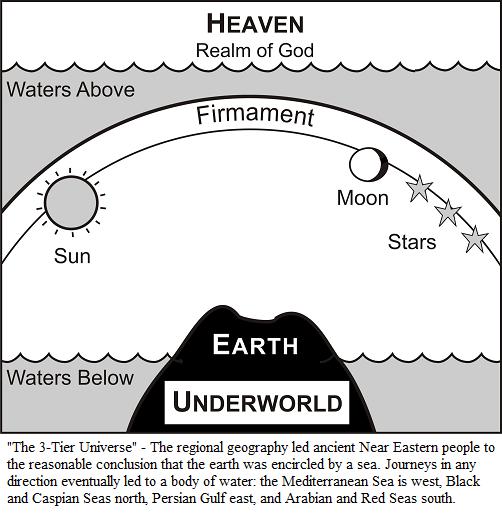Calminian
Senior Veteran
- Feb 14, 2005
- 6,789
- 1,044
- Faith
- Christian
- Marital Status
- Married
- Politics
- US-Republican
Yes, in the heaven with waters above it
Yes, the "waters" not an ocean as you've been advocating. I fully admit there are some of those original waters somewhere beyond the cosmos. Dr. Russell Humphreys wrote a book called "Starlight and Time" in which he offers a similar exegesis. But the Psalmist confirms it for me.
Psa. 148:4 Praise Him, you heavens of heavens, And you waters above the heavens!
But this water is above the heavens, not in the heavens held up by a solid dome.
Why does that mean they didn't view it as a solid mass?
Because clouds very obviously to the naked eye are not attached to anything solid. There's nothing is scripture to indicate heaven is solid. This is why the word "expanse" is a much better translation than the latin firmament.
Yet, a lot of literalists use Genesis 1:1 as evidence that God made everything ex nihlo. Often if a someone calls that verse a title they are labeled as a liberal by the literalists. Yet here you are, literally interpreting it differently than other literalists. (FYI, I kind of agree with the title aspect to the verse but haven't made any conclusions yet.)
I'm also a believer in ex nihilo. I'm not sure where you think literalists disagree with me. And I'm not a literalist. I believe the bible is filled with figurative language. I just allow the authors to indicate where it is and not modern science.
And if you agree with me on the title aspect, then you probably should come with me the rest of the way. I don't see any other way you can align yourself with Seely.
I have a theory of 4 heavens? How did you get that idea? Why are you talking about two earths?
Think about it. Heavens (shamayim) is a plural. That's why it's translated the heavens. There is an implicit pluralism to the word. If the heaven of Gen. 1:1 is different than the heaven of verse 8 you have at least four heavens.
And to be consistent, earth is also mentioned in Gen. 1:1 and later in verse 9. If you're going to be consistent, then earth has to be separate as well. You can have it one way for earth and another for heaven in order to support your theory.
But if you side with me in the title aspect, the problem is solved.
He used the name "heaven" to describe the firmament. I don't understand what your question is. You described multiple heavens just as I had stated, we seem to agree on that. So what are you asking? Or better yet, what do you think I've been trying to say?
According to the text, the heavens of Genesis 1 is the firmament (the expanse). The expanse described in Gen. 1 is the heavens. They are the same. There is no distinction in the Bible. The gathered waters of Genesis 1 are the sea. The sea is the gathered waters. The dry ground is the land. The land is the dry ground created in verse 9. There is a 1 to 1 correspondence in all of these according to the text.
What you've been doing is forcing the text to be concordant with an ancient cosmology of a solid sky holding back a heavenly ocean. You're doing what you've accused others of doing. Your motive is to escape a straightforward reading of the Bible. Respectfully, I believe that's what Seely is doing.
Last edited:
Upvote
0

